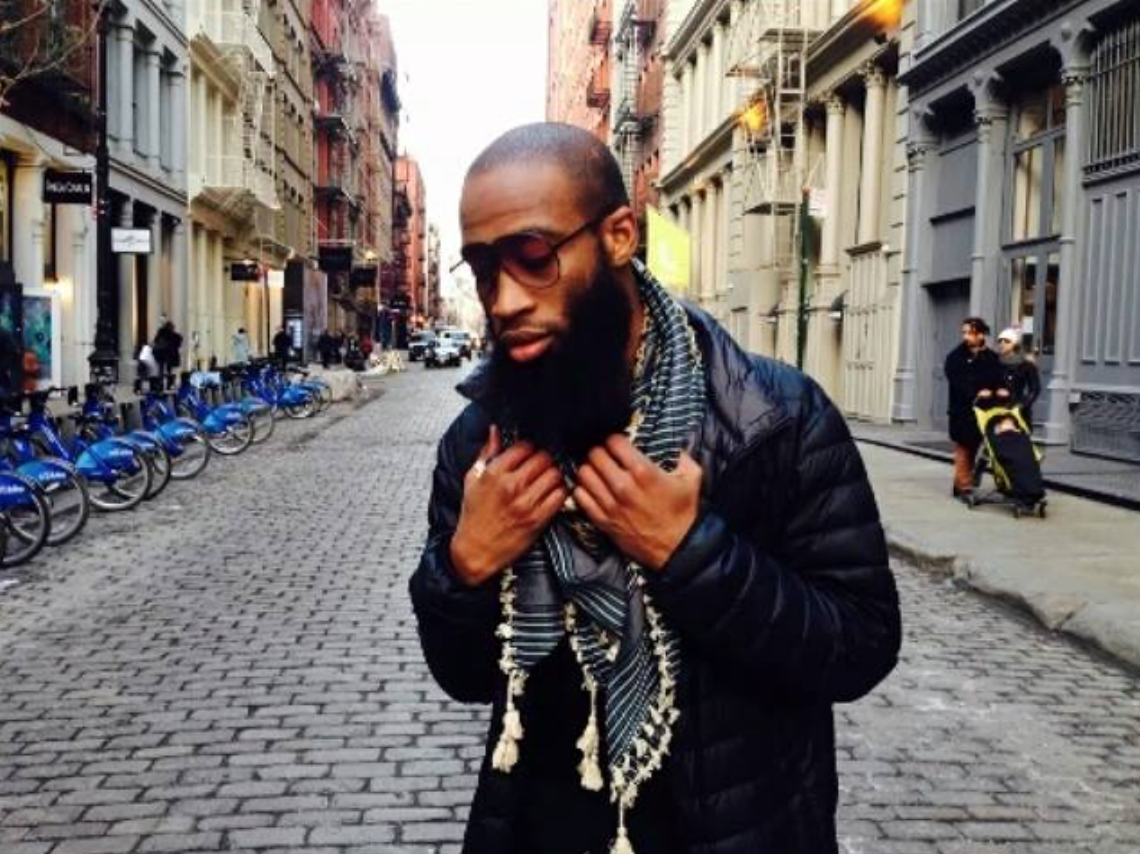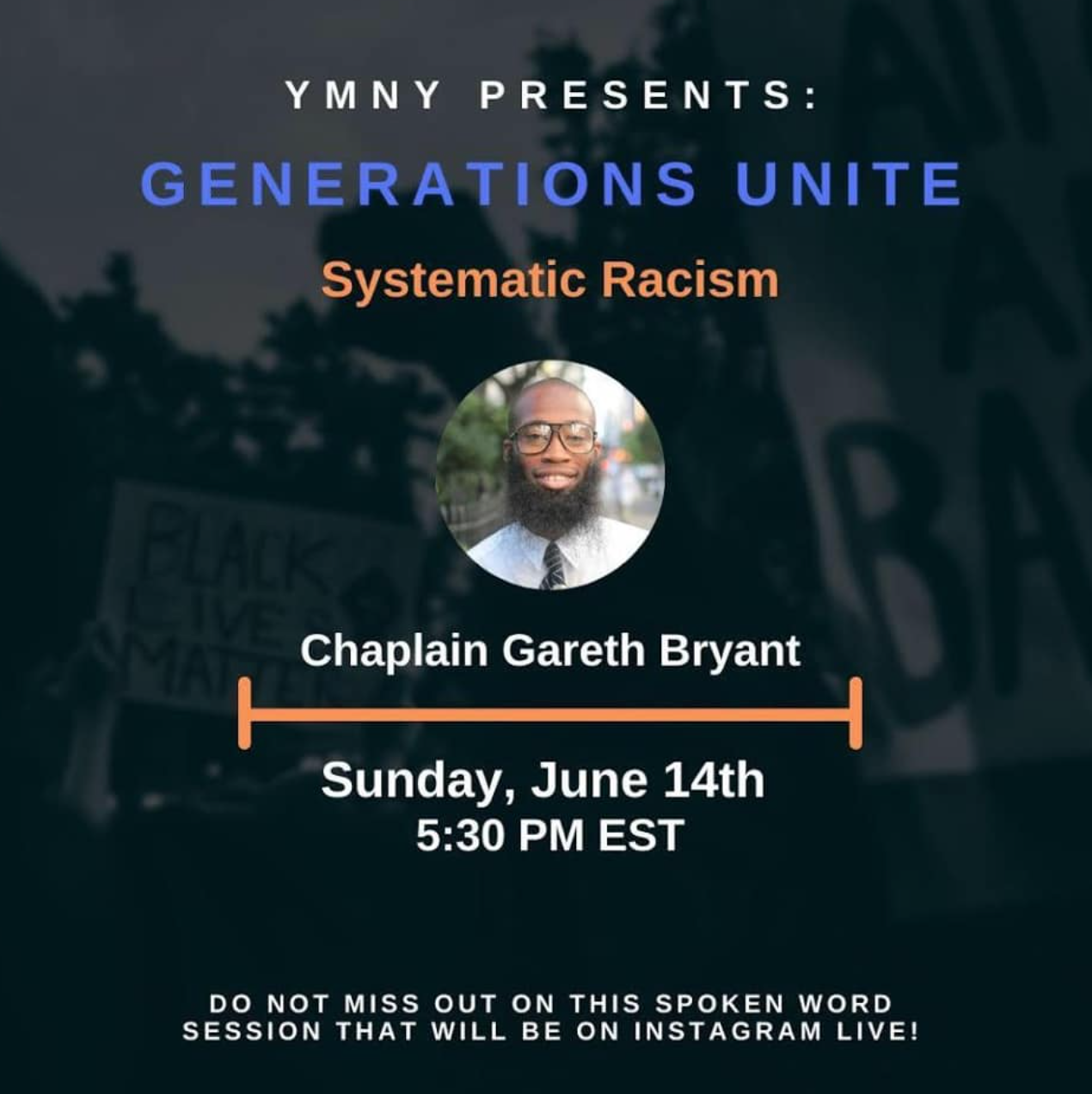Gareth Bryant On Being A Black Muslim Man In America


BEDFORD STUYVESANT – Gareth Bryant has been on Earth for 38 years thus far. In these 38 years, he has experienced a lot. He’s dealt with racism and xenophobia. He lost himself and then found himself. He discovered faith. And he never let anything stop him.
Every morning, Bryant wakes up and prays Fajr. If he doesn’t have work that day, he goes back to sleep. He is currently a chaplain at Northwell Health Lenox-Hill Hospital. He explained that the coronavirus has everyone on edge. People look at one another strangely and there is a lot of paranoia. Before working at the hospital, he did prison chaplaincy. When visiting patients at the psychiatric ward at the hospital, he cannot help but think of the similarities – the checkpoints and security measures put into place, he explained.
When he’s not working, he’s walking. He walks on average about four miles a day. It’s therapeutic, he told us. “It allows you to just release stress. Plus, it’s obviously good for cardiovascular reasons. You get a chance to observe your surroundings; observe your environment in ways you don’t normally do when you’re rushing for work.”
In 1994, when he was 12 years old, he stopped self-identifying as a Christian. In 1996, when he was in high school, he had a mandatory assignment in his Global History class where everyone had to choose three religions that they knew little to nothing about. Bryant chose Hinduism, Judaism, and Islam. One of his teachers saw that Bryant was showing a keen interest in Islam, based on the research he was doing. So, his teacher took him to an Islamic bookstore in Bed Stuy, where he bought young Bryant an English translation of the Quran. The teacher wasn’t even Muslim. In October of that year, he started reading the translation of the Quran. By December, Bryant had converted to Islam.
“It was everything that I was reading. There wasn’t one particular thing,” he said. “The Quran literally gave me answers that I was looking for but never found via the Judaio-Christian narrative. And it just gave clarity about everything that I wanted clarity for.”
In 2002, Bryant joined Young Muslims, a non-profit national youth organization, and was a part of it until 2010. It was after September 11 and he had already left high school. During this time, as a Black Muslim man in Brooklyn, he was going through a lot of “turbulence and scenarios” in his life. He felt lost again. When he joined YM, it gave him some grounding.
“It gave me comradery with people from my age group. Besides the fact that they weren’t Afro American or Latino, or Muslim reverts, we still had a lot in common by virtue of the fact that most of us were born and raised here,” he said. “We were very much the same. We listened to the same type of music. We watched the same type of sports. We liked the same type of girls.”
On Sunday, June 14, Bryant will be leading a spoken word session for Young Muslims that addresses systematic racism. He’s been writing poetry since 2008; writing about anything and everything.
“Poetry allows you to express things that you are very restricted to express in regular language,” he said. “Poetry is a very liberating art form. In fact, it is the most liberal and most liberating literary form. That’s one of the reasons why rap music is so popular; its base is poetic. The base is poetry.”

Racism is something Bryant knows a lot about. He explained that it is impossible to grow up in NYC and not witness police brutality on any level. “It’s impossible,” he repeated.
He remembers being in junior high school and being racially profiled by the police. He remembers being “randomly” stopped by police during Stop and Frisk. “I experienced these types of things. It’s racist, but it’s also xenophobic,” he said.
Ironically, he explained, the cops that have harassed him have been non-white officers. Which brings him to racism in the Muslim community. “It’s impossible to be a Muslim in our modern times and not experience any form of racism or xenophobia. I personally witnessed and experienced more xenophobia from Muslims than I ever experienced from non-Muslims.”
Bryant regularly gives a khutbah (the Friday sermon) at the MAS Ibn Sina Center at Astoria, Queens. The last time he gave a khutbah there, he remembers speaking to an older desi man afterward.
“He said to me ‘I really enjoyed your khutbah, but why’d you have to dress like the riff-raff?'” Bryant recalled. “Basically, he’s saying, ‘Why are you dressing like a n**** on the minbar?’ That’s what he wanted to say but didn’t. I have to deal with these things on a regular basis. That is xenophobia.”
Many times, someone will give him salaam. Then they’d have a nice conversation, “And then literally out of nowhere, they’d ask me if I am Muslim. What is the point of you initiating the salaam to someone and then asking them if they are Muslim?”
Racism and xenophobia amongst Muslims exist, he explained, and it needs to stop.
“Muslims always want to deflect from the fact that xenophobia exists when they want to mention Bilal Ibn Rabah (a companion of Prophet Muhammad). Anytime you hear a Muslim mention Bilal Ibn Rabah, they are automatically coming from a xenophobic space and place. Especially if they are Arab,” he said. “Bilal Ibn Rabah was Arab. This shows you how deeply rooted xenophobia is, that Arabs literally to this day deny the Arabness of Bilal Ibn Rabah and they paint him with this brush of ‘Blackness,’ when in fact, he was not African. He was Arab.”
He said the racism he has experienced in his life is disappointing, but not surprising. And to end racism is a huge task.
“Every Euro-centric country on the planet is predicated on white supremacy; rooted in white supremacy. Realistically, the only way that white supremacy will be destroyed is if our current political matrix is destroyed,” he said. “Because you can’t separate the U.S. from white supremacy. White supremacy literally defines the entire founding of history and all of the policies that have ever been enacted by the U.S… The system itself was designed to be corrupt. The system itself was designed to be oppressive. You can’t fix a system like that. You cant’ fix something that was literally made to be evil. You can’t. So the only way to make a true change is you have to abolish the system.”
Start with defunding the police, he said.
“There’s no logical reason for how and why law enforcement should have military-style weapons. That is what the National Guard is for. What’s the point in having a National Guard when you have local municipal police forces that look like special forces? It’s ridiculous. That’s literally how and why law enforcement is so emboldened to oppress people. It’s because of their firepower.”
He explained that people who say All Lives Matter are xenophobic. It’s as easy as that.
“It’s a direct deflection from reality as to how and why the concept of Black Lives Matter exists. People who say All Lives Matter know this, that the concept of Black Lives Matter doesn’t mean Black Lives Matter only,” he said. “It’s making a point that per white supremacy, Black lives don’t matter. We have to make Black lives matter once again.”



